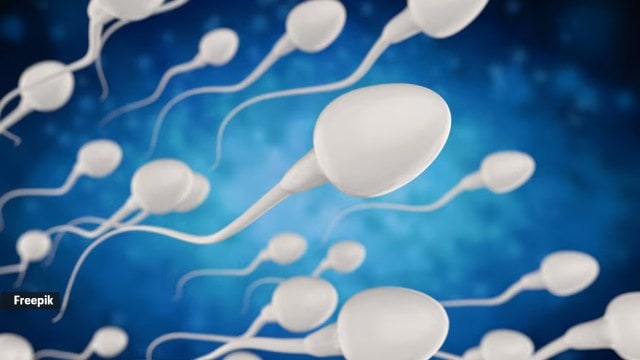📣 For more lifestyle news, click here to join our WhatsApp Channel and also follow us on Instagram
Fact check: If you are obese, there is 80 percent probability your sperm count will be zero
While the bulk of global research focuses on Western populations, public health intellectual Dr Jagadish Hiremath says, there is emerging evidence of a similar trend among Indian men
 These claims highlight the issue of declining sperm count in men (Source: Freepik)
These claims highlight the issue of declining sperm count in men (Source: Freepik)In a viral clip from Raj Shamani’s Figuring Out podcast doing the rounds on social media, content creator Prashant Desai claimed that men’s sperm count has dropped by 50-60% in the last 40 years.
He mentioned, “As obesity has increased, sperm count has come down. Last 40 years mein men ka sperm count (In the last 40 years men’s sperm count) has come down by 50 to 60 percent.”
He also stated that obesity increases the probability of having zero sperm count, suggesting that obese men are less likely to father children. “If you are obese, you have an 80 percent probability your sperm count will be zero compared to a non-obese person,” he said.
View this post on Instagram
These claims highlight the issue of declining sperm count in men and its connection to lifestyle factors like obesity, but the exact reasons behind it remain complex.
Scientific evidence supporting the claim that men’s sperm count has declined by 50-60% over the last 40 years
Dr Jagadish Hiremath, a public health intellectual, clarifies, “Yes, the claim that men’s sperm count has declined by 50-60% over the last four decades is supported by robust scientific evidence, primarily from studies conducted in North America, Europe, and Australia. A landmark meta-analysis published in Human Reproduction Update (2017) by Dr Shanna Swan et al. revealed a 59.3% decline in sperm count and a 52.4% drop in sperm concentration between 1973 and 2011 among men in Western countries.”
What about Indian men?
While the bulk of global research focuses on Western populations, Dr Hiremath says, there is emerging evidence of a similar trend among Indian men:
He notes, “A study published in Indian Journal of Endocrinology and Metabolism (2013) observed that sperm concentration in Indian men has declined by 30-40% over the last few decades, with average sperm concentration dropping from 113 million/mL in the 1980s to 50 million/mL in the 2010s.”
“Another study in Asian Journal of Andrology (2012) attributed declining sperm quality in Indian men to factors such as urbanisation, increased exposure to environmental toxins, and lifestyle changes, including poor diet and stress,” highlights Dr Hiremath.
How does obesity impact sperm count and fertility in men?
Dr Hiremath mentions, “Obesity significantly increases the risk of infertility but does not universally result in azoospermia (complete absence of sperm).” Studies indicate:
Subfertility and Infertility Risk: Obese men are 42% more likely to experience infertility compared to normal-weight men (Reproductive Biology and Endocrinology, 2019).
Azoospermia and Severe Cases: Extreme obesity (BMI >40) can lead to severe hormonal disruptions, resulting in conditions like hypogonadism and azoospermia in rare cases.
“While obesity does increase the risk of infertility, it is one of many contributing factors. Factors like diabetes, sleep apnea, and poor lifestyle habits often coexist with obesity and exacerbate reproductive health issues,” he adds.
 Obese men are 42% more likely to experience infertility compared to normal-weight men (Source: Freepik)
Obese men are 42% more likely to experience infertility compared to normal-weight men (Source: Freepik)
Steps can men take to improve sperm count and fertility
Here are some steps suggested by Dr Hiremath:
Adopt a healthy diet: Include antioxidant-rich foods like fruits, vegetables, nuts, and seeds to combat oxidative stress. Increase intake of zinc, selenium, and omega-3 fatty acids to support sperm production.
Maintain a healthy weight: Gradual weight loss through diet and moderate exercise can improve testosterone levels and sperm parameters.
Exercise regularly: Moderate physical activity improves sperm motility and reduces oxidative stress. However, excessive high-intensity training may lower testosterone levels.
Limit exposure to environmental toxins: Avoid exposure to pesticides, plastics, and heavy metals. Switch to glass or stainless steel containers and organic food options where possible.
Avoid smoking and alcohol: Both impair sperm quality and increase the risk of infertility.
Seek medical support: Hormonal therapies, lifestyle interventions, and antioxidant supplementation may be necessary for individuals with significant hormonal imbalances or oxidative damage.
DISCLAIMER: This article is based on information from the public domain and/or the experts we spoke to. Always consult your health practitioner before starting any routine.
📣 For more lifestyle news, click here to join our WhatsApp Channel and also follow us on Instagram





- 01
- 02
- 03
- 04
- 05






















